Editor’s note: The following item is republished with permission of houzz.com. See the original article: Expert Lighting Design Secrets.
Erik Thompson of Quatro Lighting Designs is an expert in how to show your home in the right light. Planning lighting for your entire house or even one room can be an overwhelming task, and hiring a lighting designer is the easiest solution. But if you’re on a tight budget, this may not be possible. So Thompson has generously offered up some of his top lighting advice.
His no. 1 piece of advice is to plan ahead, as often lighting comes up after you’ve run through your budget. "No matter how many beautiful items you’ve bought for your home, without proper illumination you are left in the dark," Thompson says. "Proper lighting design can make a project successful."
If you can afford a lighting designer, Thompson recommends checking out the designer’s portfolio and finding one that suits your personal style. This way, you’ll trust him or her, keep an open mind, and be able to relax and leave yourself in his or her hands. Finally, make sure to prioritize the functions you’ll need from your lighting scheme for different times of day and night and different purposes.
"Lighting is not just about ambiance or properly lighting an area, but about how you can make these areas come to life," Thompson explains.
Set multiple scenes
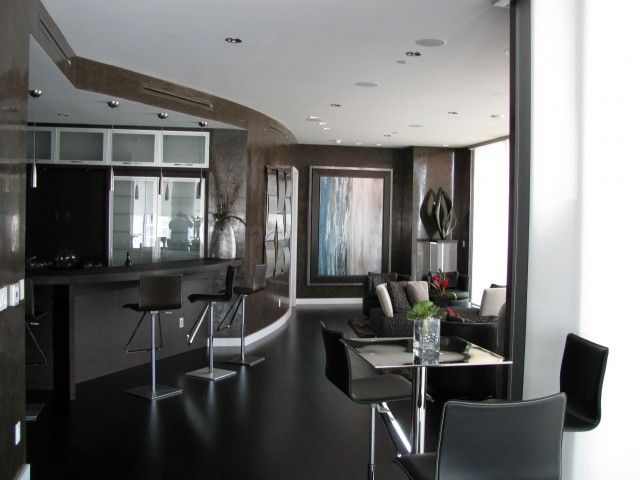
Photo credit: Erik Thompson – Quatro Lighting Designs
"When designing your lighting layout, you always want to set multiple scenes by integrating the use of concealed light sources and integrating lighting controls for setting different moods," Thompson says.
In this open floor plan, the chef can have bright light for cooking. Kids doing homework at the counter can have ample reading light as well, and those in the living area can enjoy more intimate dim light while admiring the art lighting on that big piece on the wall.
…CONTINUED
Do art lighting right
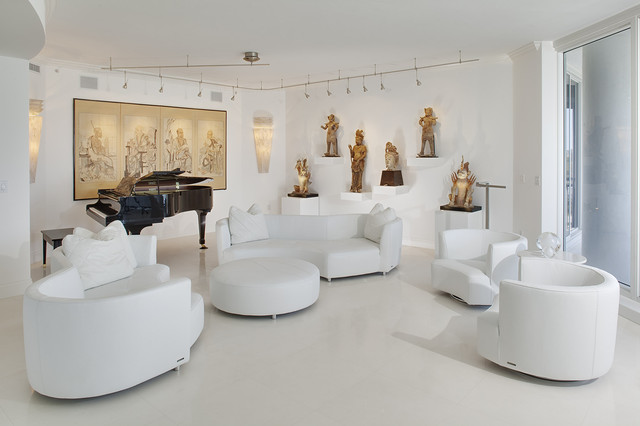
Photo credit: Joie Wilson
This can be one of the trickiest tasks to try on your own. "There are many different techniques for lighting art and thousands of fixtures to choose from," says Thompson. "Decide which fixture is most appealing for the room and the art, whether it’s track lighting, recessed lighting, mono points or floor lamps."
"You need to ask yourself what degree of lamp will better suit the art, and the color temperature is very important," he says. This makes all the difference in the art-lighting world."
"Please remember you do not want flashy lighting for your art; the more your art lighting blends into the environment of your home, the better. We are lighting the art, not ‘arting’ the light," Thompson says.
…CONTINUED
Customize on a budget
"To have a custom piece, you don’t have to always pay a high price," Thompson says. "Customizing can be something as simple as changing lengths, using Edison bulbs in a contemporary fixture or using LEDs in a bubble light." The last suggestion will change the light tone from the usual yellow to bright white.
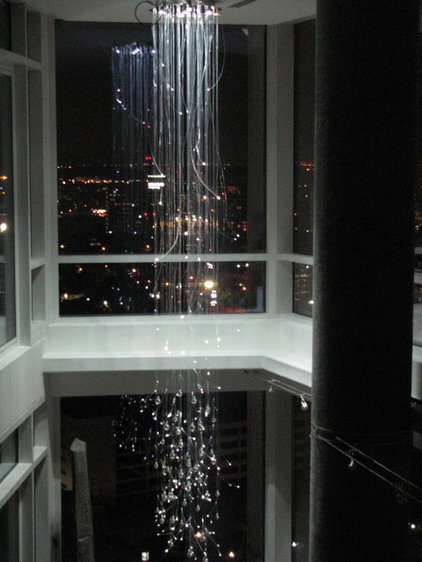
Photo credit: Erik Thompson – Quatro Lighting Designs
In the case of this droplet chandelier, Thompson rewired the entire fixture with fiber optics, enhancing the look and saving his client thousands of dollars (a custom fiber optic fixture like this runs much more than the original fixture and Thompson’s customization costs added together).
In case you were wondering, this fixture is now 18 feet long. Take a look at what the original light looked like before customization.
…CONTINUED
Perfect your fixture placement
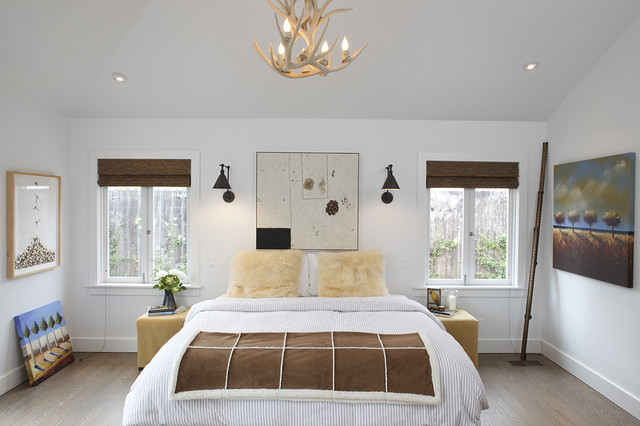
Photo credit: Artistic Designs for Living, Tineke Triggs
"Some lighting angles are more flattering than others. The position of light fixtures creates a number of visual aspects," Thompson explains. "When choosing fixture placements, always keep height, fixture size and positioning in mind."
In this room, the antler chandelier clears the artwork and is well placed in relation to where the ceiling meets the wall. The library sconces not only are well placed for the function of reading in bed, but they also frame the artwork and pick up on the black in the painting.
…CONTINUED
Use color
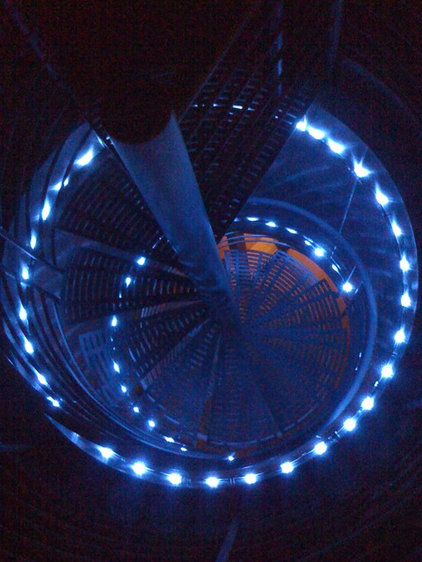
Photo credit: Erik Thompson – Quatro Lighting Designs
"Color can be amazing when used in the right location, so keep an open mind about it," Thompson says. "For instance, highlighting a wall, using cove lighting in a bar area or theater, or placing halo lighting around art sculptures or bookshelves can pack just the right punch of color."
This spiral staircase takes on a futuristic look when illuminated by indigo lights at night.
More from houzz.com:
- Ideas: Browse 60k+ lighting products
- Be inspired by thousands of living room ideas
- Help!: Find a lighting designer in your area
Copyright houzz.com 2012
